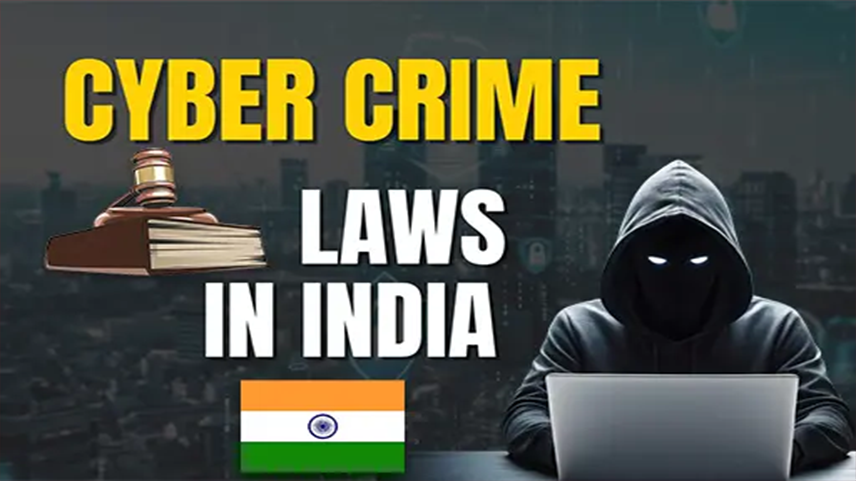
Cyber Crime Laws in India: Key Acts, Offenses, and Protection

In our fast-paced digital world, where technology and artificial intelligence are now part of everyday lives, the increase in cybercrimes is a major issue. As India gets closer to achieving the goals of the "Digital India" mission, it is necessary for there to be a strong legal framework to ensure the safety of individuals, businesses, and the nation itself from digital threats.
Cybercrimes have proliferated across the country in the recent past and threaten people, businesses, and also governmental entities. The harm from cybercrime includes more than just a financial loss but also the compromise of intellectual property and sensitive data, service disruption, and, in some cases, physical damage to infrastructure. There exist several cyber laws in India that are designed to address issues that regulate digital anonymity, establish penalties, and determine liability for who is responsible for damages caused by cybercrimes.
The following is a general understanding of cybercrimes and their types.
Cybercrimeis legally defined as any illegal act involving a computer, a network, or the internet and can be separated into several descriptions:
● Breach of Cybersecurity
This causes unauthorized use of computers, networks, and timestamps. Cyber attackers, across the spectrum of breaching cybersecurity, can steal sensitive data, deploy ransomware attacks, disrupt services, or explore and compromise control of supply chains.
● Cyber Threats
Hackers conduct activities such as phishing attacks, Trojan malware, and Advanced Persistent Threats (APTs) that disrupt computers and trick users into giving confidential information.
● Digital Content Offenses & Cyberbullying
This is broad enough to include producing or transmitting harmful content digitally, including hate speech, identity fraud, cyberstalking, child pornography, and other forms of harassment. Acts under the IT Act and Indian Penal Code criminalize these activities.
● Fraudulent Online Transactions
Cyber frauds such as the use of credit cards, phishing requests for fake OTPs, and Aadhaar-based frauds are numerous. Cyber criminals cheat individuals and businesses to get money, personal information, or digital signatures.
What is cyber law?
Cyber law (information technology law) refers to the law that is related to the generation, transmission, and storage of digital information, specifically via the internet, electronic devices, and computer networks. It addresses issues like electronic agreements, digital crime, data privacy, mandated jurisdiction to operate in the cyber turf, and so forth. The law seeks to protect the rights of individuals and to promote positive online behavior.
Important Cyber Laws in India
The backbone of India's cyber law framework is the Information Technology Act, 2000, which defines cybercrimes and outlines punishments for illegal activities such as hacking, data theft, cyberterrorism, and the publication of offensive materials online.
The Digital Personal Data Protection Act, 2023 (DPDPA), also provides support for privacy, given that it governs the processes for collecting, processing, and storingpersonal data. It emphasizes the needs of minors by requiring parental consent to process minors’ data.
Furthermore, India has created institutions such as the Indian Computer/Emergency Response Team (CERT-In) and the National Cyber Coordination Centre (NCSC) to assist in monitoring and responding to cyber threats. Companies are mandated to report breaches of any data within 6 hours of acquiring knowledge that they notify CERT-In.
Why Cyber Law Matters
Cyber law plays a vital role in maintaining a secure and trustworthy online environment. Its key objectives include:
- Privacy protection: Cyber law is situated in the context of privacy protection to prevent personal data from being misused or leaked.
- Deterrence of cybercrime: Cyber law outlines ways in which offenders can be punished for serious and harmful crimes such as hacking, phishing, cyberbullying, and related crimes against children.
- Mandatory cybersecurity: Cyber law directs businesses to have certain measures in place to protect their computer networks and sensitive information.
Categories of Cyber Laws in India
Cyber laws in India can fall into three categories:
- Cybercrime: Laws that cover crimes like hacking, cyberstalking, and access without authorization.
- Cybersecurity: Laws that protect IT infrastructure and data systems.
- Data protection: Laws that cover how the data identifiers of a user, including their personal data, can be collected, processed, and safeguarded, with specific reference to user consent.
How to Stay Safe Online
- Take steps to ensure your computer is using a strong antivirus program to find or remove unwanted programs.
- Set up any of your online accounts that permit strong passwords and use two-factor authentication.
- Be careful about how much personal information you share online, and be cautious with links in messages that could entice you.
Cybercrime laws are changing in India to keep up with this changing reality. By understanding cyber laws and a few ways to be safe online, users and organizations are better protected in today's digital reality.
